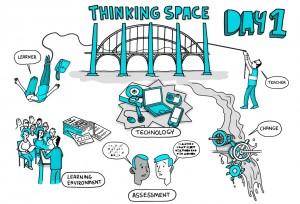
• David Puttnam, Lord Puttnam of Queensgate, in his opening keynote at Innovating e-Learning 2011, argued for greater investment in ICT to enable UK universities, colleges and schools to deliver a world-class education. ‘Digital technology is the driving force behind change. We cannot afford not to invest in it.’ David Puttnam
• Bill Rammell, deputy vice-chancellor of Plymouth University, outlined the tensions of collaboration in a changing landscape. An understanding of technology was essential for the future of higher education institutions: ‘The changing landscape will require institutions to become more efficient Digital Organisations.’ Bill Rammell
• Tansy Jessop and Yaz El-Hakim ((University of Winchester) and Paul Hyland (Bath Spa University) explored work originating in the TESTA project on addressing specific disciplinary and programme-wide issues in assessment and feedback: ‘Programme teams are often working hard without energising their students or working smartly.’ Yaz El-Hakim. ‘The definitions of the terms are really elusive. We either need a shared understanding from discussion or a fresh vocabulary for talking about assessment.’ Tansy Jessop
• Liz Dunne, Dale Potter and Derfel Owen (Exeter University) gave their experiences of engaging students as agents of change in the INTEGRATE project: ‘A commercial service-customer relationship between institutions and students simply will not work. You need to empower students not just to identify the changes they want but also to take an active part in creating the solutions.’ Derfel Owen
• ELRAH, a collaborative venture between Edinburgh Napier University, Edinburgh’s Telford College and Edinburgh City Council used a JISC-funded WBL Maturity Toolkit to develop a model of online learning to support development of a new undergraduate programme in Youth Work: ‘Where there’s a will, there’s always a way!’ Morag Gray
• Sally Graham, Joy Jarvis (University of Hertfordshire) chart the developing story of the conference in graphic formats each day at 9 am: ‘Excellent shorthand for thinking further.’ Neil Spurgeon, Delegate
• James Clay in the conference blog, Letters from the Edge, summed up the striking advantages of online conferencing: ‘What’s nice about an online conference is that not only are all the presentations available as recordings, but also there is time to reflect and you still have time to ask questions and add your thoughts and opinions.’
You can still register while the conference is underway; in an online environment there isn’t a cap on numbers! If you are unable to do so, proceedings will be available early January 2012 from www.jisc.ac.uk/elpconference11
Follow #jiscel11 on Twitter for live conference updates.

One reply on “Highlights from Theme 1 of Innovating e-Learning 2011: Learning in transition”
[…] If you haven’t been able to participate yet in this year’s JISC online conference, there are a few of the highlights from Theme 1 – Learning Landscapes – on the JISC E-Learning blog: https://elearning.jiscinvolve.org/wp/2011/11/23/highlights-from-theme-1-of-innovating-e-learning-2011… […]